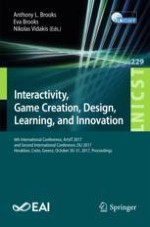2018 | OriginalPaper | Chapter
Analysis of Motivation in Virtual Reality Stroke Rehabilitation
Authors : Paula Epure, Michael B. Holte
Published in: Interactivity, Game Creation, Design, Learning, and Innovation
Publisher: Springer International Publishing
Activate our intelligent search to find suitable subject content or patents.
Select sections of text to find matching patents with Artificial Intelligence. powered by
Select sections of text to find additional relevant content using AI-assisted search. powered by
